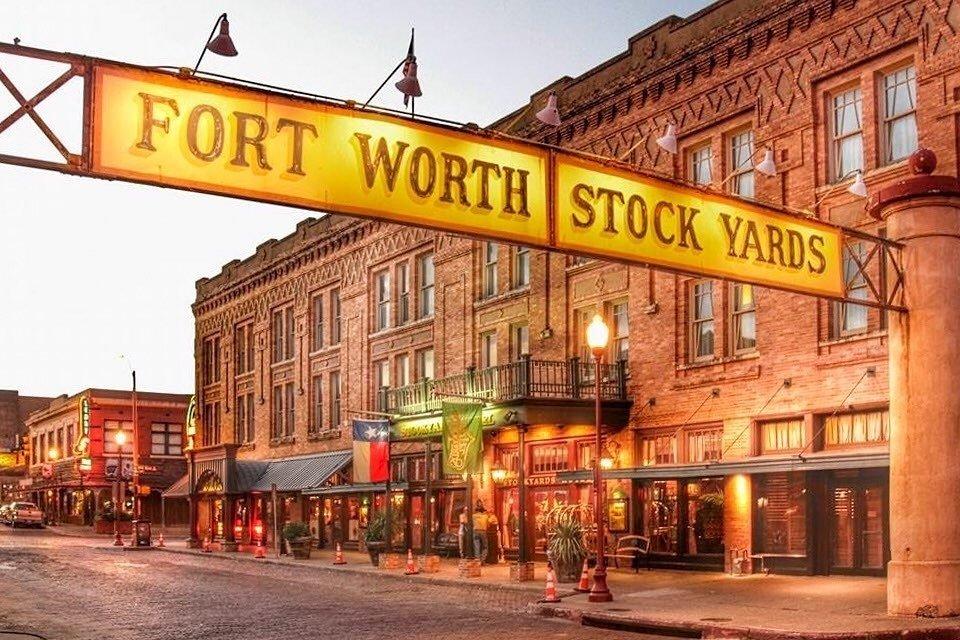A Safe Night Out
Enhancing Safety and Vibrancy in the City of Fort Worth, Texas
October 2025


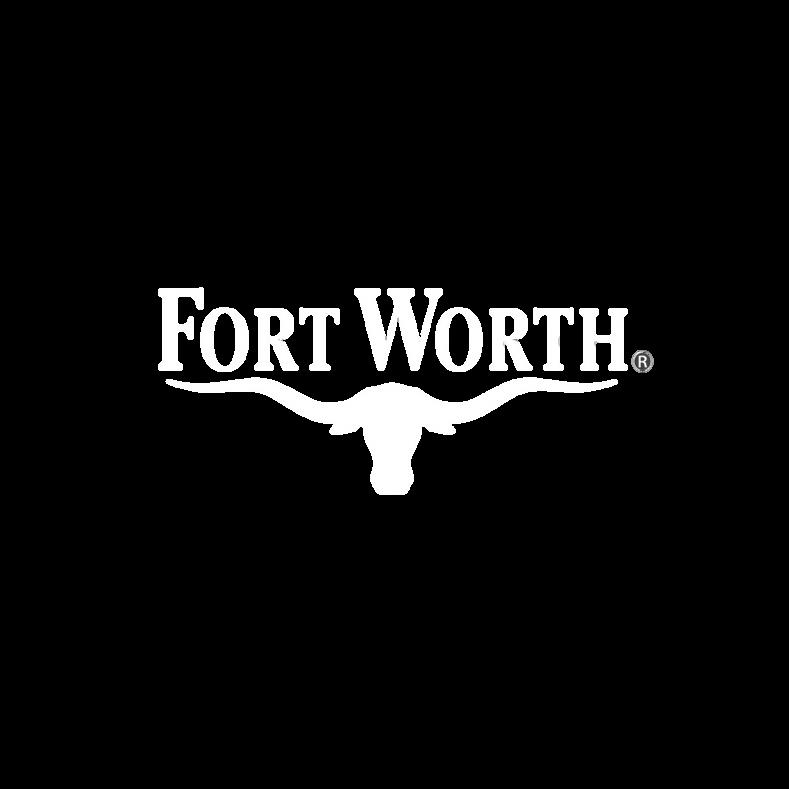


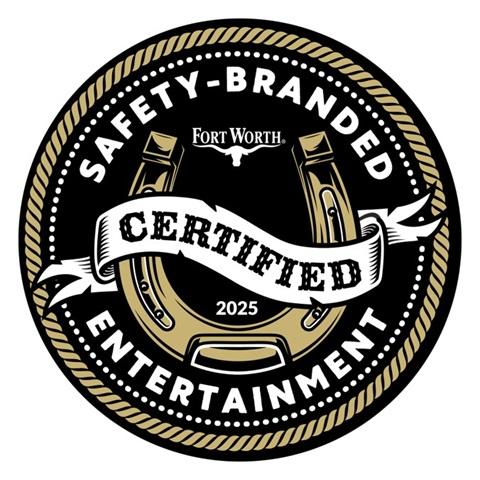



Enhancing Safety and Vibrancy in the City of Fort Worth, Texas
October 2025








The City of Fort Worth and its businesses are beneficiaries of strong social commitments by the city’s leaders to introduce and implement Safe Night’s innovative and proven nightlife model. Safe Night sincerely thanks the following people and organizations for their early support of our work and their advocacy to bring A Safe Night Out to Fort Worth: Fort Worth Entertainment District Steering Committee
• Assistant City Manager William Johnson, Fort Worth City Manager’s Office
• Assistant City Manager Fernando Costa (Ret.), Fort Worth City Manager’s Office
• Assistant City Manager Valerie Washington, Fort Worth City Manager’s Office
• Project Manager Kimberly Williams, Fort Worth City Manager’s Office
• Chief Neil Noakes (Ret.), Fort Worth Police Department
• Assistant Chief Robert Alldredge, Fort Worth Police Department
• Chief Jim Davis, Fort Worth Fire & EMS Department
• Immediate Past President Katrina Johnson, SteerFW
• Karen Johnson, Fort Worth Human Relations Commission
• Director Mike Crum, Public Events
• Director Christina Brooks, Diversity and Inclusion
• Interim Chief Transformation Officer Clay Pearson, FWLab
• President Andy Taft, Downtown Fort Worth, Inc.
• President Johnny Campbell, City Center Management
• President Paul Paine, Fort Worth Stockyards, Inc.
• Former CEO Craig Cavileer, Majestic Realty
• President Mike Brennan, Near Southside, Inc.
• Scott Wilcox, Cultural District Alliance
• President Chas Taipale, West 7th Restaurant and Bar Association
• President Emil Bragdon, Funk Lime Hospitality Group
• Co-Manager Moody Younger, Younger Partners
• President Bob Jameson, Visit Fort Worth


In December 2023, the City of Fort Worth and Assistant City Manager Fernando Costa (Ret.) invited Safe Night LLC (Safe Night) to present a plan for enhancing nightlife safety and vibrancy to city stakeholders, including the newly formed Entertainment District Steering Committee. After learning about Safe Night’s evidence-based prevention models and successful implementation in other cities, the steering committee invited Safe Night to bring A Safe Night Out to Fort Worth.
Founded in 2018, Safe Night is a consulting firm that provides solutions to increase trust, safety, and economic viability in communities Safe Night collaborates with police departments, local and state enforcement agencies, economic development organizations, business improvement districts, private businesses, community groups, and public-private partnerships to enhance community safety and vibrancy. A Safe Night Out is the only nightlife management model in the United States to incorporate a voluntary bar and restaurant accreditation program, while also teaching municipal agencies to transition from reactive enforcement to proactive prevention. Our first accreditation program flourished in Arlington, Virginia (Arlington Restaurant Initiative), and is the template for other successful nightlife management models in Dallas, Texas (Good Neighbor Initiative - Copper Star Certification), Norfolk, Virginia (Gold Bar Norfolk), and Greenwich Village, New York City (Village Safe Spot).
Safe Night's nightlife assessment process identifies a city’s strengths and needs through the collection of quantitative and qualitative data, including stakeholder interviews, in-person observation of nightlife areas, and expert reviews of current public safety and business operations. After a thorough assessment, Safe Night provides a blueprint for city agencies and businesses to implement a multi-component model that enhances nightlife safety practices and successfully engages in prevention and alcohol-related harm reduction.
Safe Night officially began providing technical assistance and consultation to the City of Fort Worth in April 2024 Safe Night started by collecting data from the Fort Worth Police Department and Fort Worth Fire and EMS Department to conduct a Risk Terrain Modeling (RTM) analysis for the West 7th, Stockyards, Downtown-South Main, and Magnolia-Near Southside neighborhoods. The RTM analysis revealed the exact geographical areas, environmental factors, and relevant stakeholders that would contribute to the most effective prevention strategies.
During the summer of 2024, Safe Night staff made several visits to Fort Worth, including the West 7th, Stockyards, Downtown-South Main, and Magnolia-Near Southside neighborhoods on Fridays, Saturdays, and Sundays, both during the day (9 a.m. - 4 p.m.) and at night (9 p.m. - 4 a.m.) to observe the area Safe Night staff conducted interviews with city staff, property owners, public improvement district directors, and business owners to determine their perceptions about the key issues in each entertainment district. These interviews added context to the qualitative data analysis, helping to identify specific needs and challenges. In August 2024, Safe Night presented its findings to the Fort Worth Entertainment District


Steering Committee in a presentation and accompanying document titled "City of Fort Worth Nightlife Assessment and Recommendations Report."
Throughout the fall of 2024, Safe Night developed the framework and policies for a voluntary bar and restaurant accreditation program meant to elevate the standards of businesses and venues serving alcohol. During the winter of 2025, the city's communications team, steering committee, and the West 7th Restaurant and Bar Association finalized the standards and policies, and officially named the program the Golden Lasso Accreditation.
Lastly, in March 2025, Safe Night delivered a three-day nightlife management training to Fort Worth municipal stakeholders, including the Proactive Alliance relationship-based approach and guidance on building a multidisciplinary nightlife team. Municipal agency training focused on prioritizing prevention over enforcement, collaborative problem-solving, and building individual relationships with business owners. On the third day of training, Safe Night invited all stakeholders, including bar and restaurant owners and community-based organizations, to officially introduce the Golden Lasso accreditation
This case study will discuss A Safe Night Out and the Golden Lasso hospitality accreditation program, highlighting its early successes as an innovative model for nightlife management.
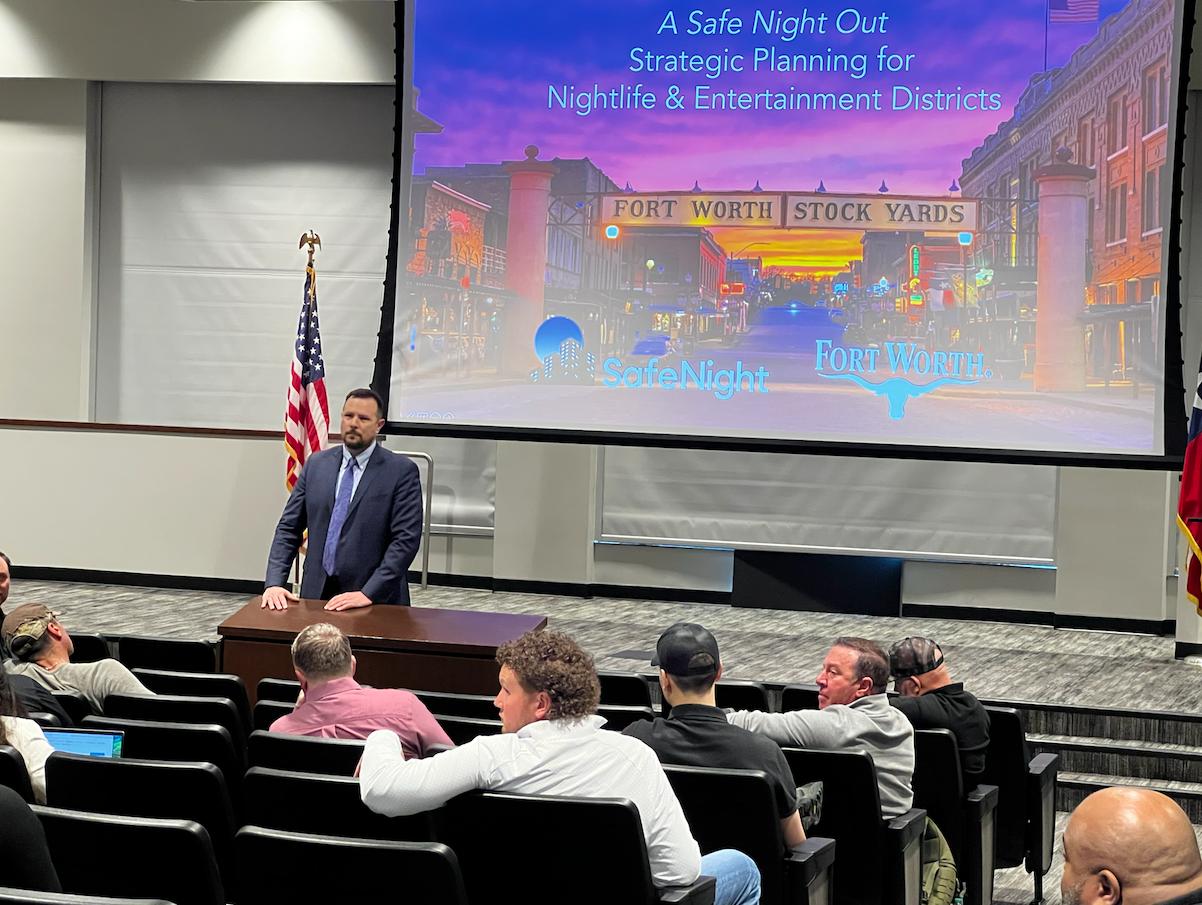


A Safe Night Out - Fort Worth Nightlife Management Model Timeline 2024 – 2025
Partnership with City of Fort Worth April 2024
Safe Night Assessment of Fort Worth Nightlife Strategies and Practices
April - August 2024
Fort Worth Assessment and Recommendations Report August 2024
Golden Lasso Accreditation Model Development December 2024
A Safe Night Out Training for Fort Worth Agency Staff and Golden Lasso Release March 2025
Fort Worth Agency Peer-to-Peer Nightlife Training April 2025



The following is a condensed summary of the findings of Safe Night’s City of Fort Worth Nightlife Assessment and Recommendations Report, which was delivered to the city leaders and the entertainment committee in August 2024. Safe Night's nightlife assessment process identifies strengths and needs through the collection of quantitative and qualitative data, including stakeholder interviews and in-person observations of the area. After a thorough assessment, Safe Night provides a blueprint for city agencies and businesses to implement a multi-component model that enhances nightlife safety practices and successfully engages in prevention and alcohol-related harm reduction.
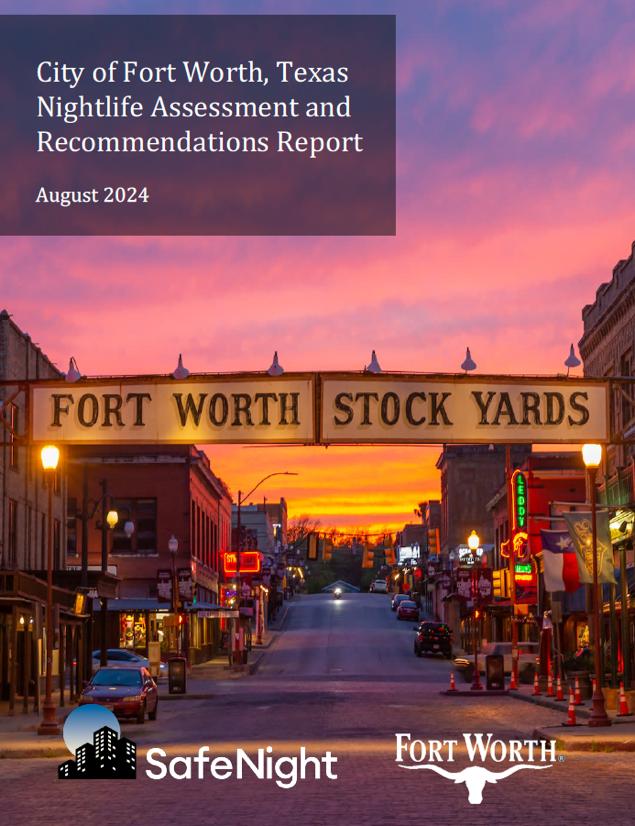
Between April and August 2024, Safe Night staff conducted a comprehensive assessment of the nightlife and entertainment districts in the West 7th, Stockyards, Downtown-South Main, and Magnolia-Near Southside neighborhoods of Fort Worth. This report identifies and details the strengths and needs of these nightlife districts and offers appropriate safety recommendations based on the following quantitative and qualitative factors:
• Crime data provided by the Fort Worth Police Department
• Fire and EMS response data provided by Fort Fire and EMS Department
• Risk Terrain Modeling (RTM) data analysis provided by Simsi, Inc.
• In-depth review of Fort Worth municipal agency staff, residents, property owners, and business owners/staff to understand specific concerns and perceptions of nightlife areas
• In-person observations of the districts during nightlife hours

Risk Terrain Modeling (RTM) Analysis
ing a Risk Terrain Modeling (RTM) analysis to identify areas are more likely to occur. RTM is a geospatial analytic tool operated by Simsi, Inc. that identifies specific environmental conditions contributing to crime, traffic crashes, and other complex community problems. An RTM analysis identifies key stakeholders to develop risk narratives, telling a story about how and why crime trends occur. Simsi Inc. utilized data from Data-Axle and the City for the RTM analysis. In the RTM analysis, Safe Night chose to focus on


disorderly conduct, simple assault, and public intoxication because these low-level offenses often lead to violence (Graham & Purcell, 2003) in nightlife settings.
The RTM analyses are meant to spark collaborative discussion about the contributing factors to the identified risk. Fort Worth community stakeholders are in the best position to create an accurate narrative for why these places are deemed high risk. With a solid sense of where and why incidents occur, city agencies and other stakeholders can more accurately address these issues and allocate resources accordingly.
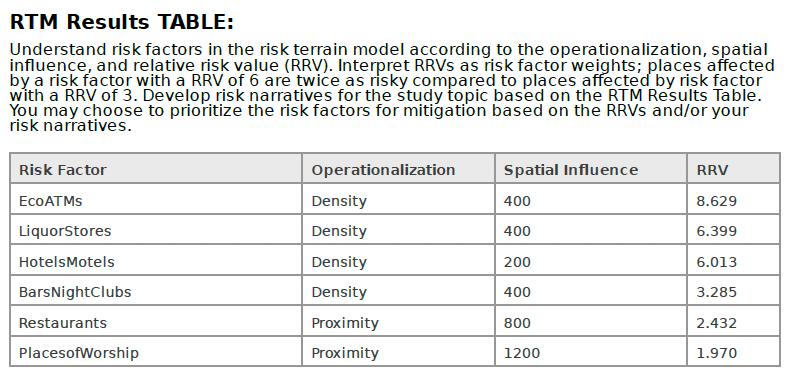
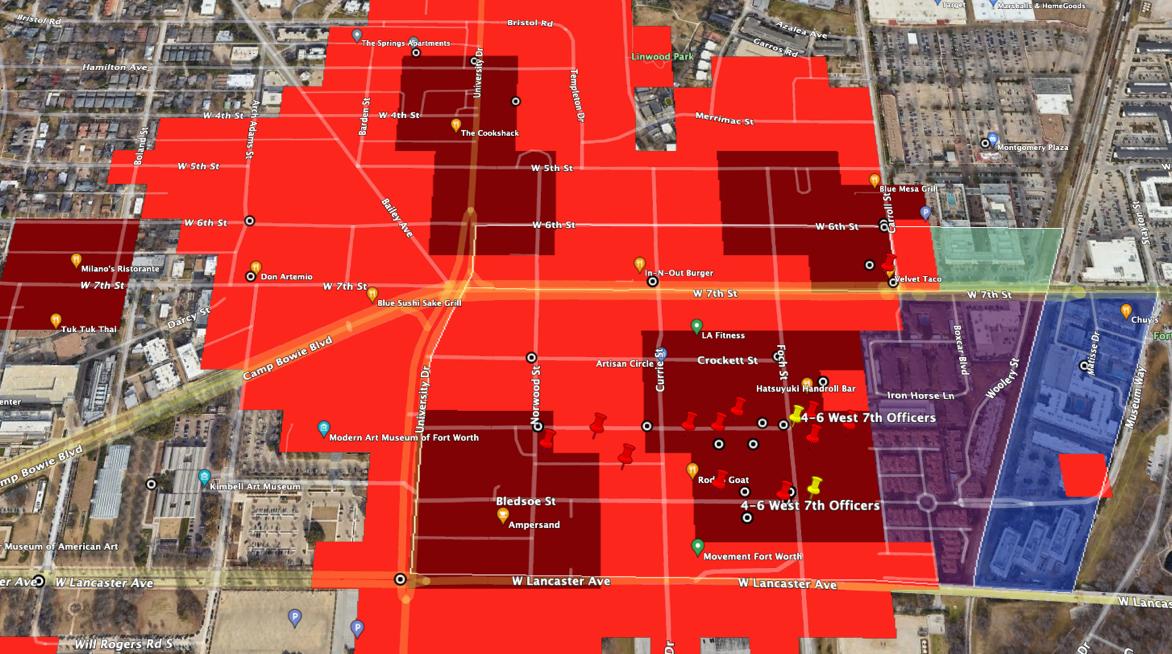


The West 7th entertainment district is a vibrant area of Fort Worth. The district is dense, with dozens of bars, restaurants, and entertainment venues. An in-depth assessment of this area confirms that, similar to other nightlife areas worldwide, the West 7th experiences problems with alcohol-related harm, including violence, disorder, and quality-of-life crimes.
The West 7th is generally well-lit, free of litter and graffiti, and has many resources to make a community-based strategy focused on enhancing safety and vibrancy successful. There is also regular collaboration through monthly meetings between the West 7th Restaurant and Bar Association, ensuring a direct line of communication between local businesses. Safe Night observed several challenges throughout the district, including dark and unattended parking lots, as well as a lack of rideshare loading zones in key locations, which would enhance mobility and accessibility. Reckless and impaired driving were prevalent throughout the district, with vehicles observed peeling out and racing.
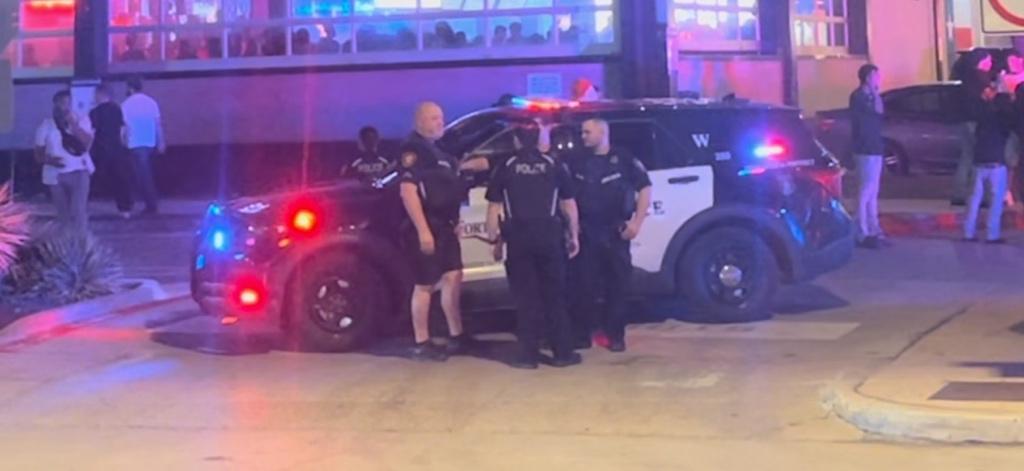
Many business owners stated they are concerned about alcohol-related violence and shootings Security varied among establishments, with a mix of bar staff and personnel hired through private security companies. Several business owners and FWPD expressed concerns about a lack of consistency in training and practices for security staff, including not removing problem patrons from establishments quickly enough to avoid problems.


The Stockyards has a mix of entertainment, shopping, and many Western-themed bars and nightclubs. Similar to the West 7th, the Stockyards experiences problems with alcohol-related harm, including violence, disorder, and quality-of-life crimes.
Property and business owners reported consistent communication with city agencies, and an active public improvement district (PID) is in place Almost every interviewee stated that city agencies make a good-faith effort to communicate with businesses, PIDs, and residents.
“Businesses are open to changes in public safety operations if they understand the police are implementing strategies that are proven and have been tested."
- Business Owner
The physical infrastructure presents issues, specifically with uneven and damaged sidewalks, posing a potential safety hazard for pedestrians. Finally, the district faces problems with reckless and impaired driving, as well as a lack of proper rideshare loading zones, both of which contribute to unsafe conditions and traffic congestion.
Crime, Disorder, & Safety
Several bars and restaurants in the Stockyards employ off-duty officers, and security staff are commonly present at these establishments in the district Access to open-container alcohol was a prominent concern because this practice reduces an establishment's control over who has access to alcohol and how much they consume.
Downtown Fort Worth is a vibrant area renowned for its diverse mix of culture, history, entertainment, and businesses. The district is walkable with bars, restaurants, museums, theaters, and shops.
Strengths and Challenges
The downtown area is well-lit and maintained, especially around Sundance Square. Businesses reported consistent communication with city agencies, and the Downtown Fort Worth PID is very active. Many interviewees stated that they are satisfied with the level of service and communication provided by city agencies.
Crime, Disorder, & Safety
The Downtown area’s most prominent issues were loud cars, reckless driving, drag racing, and homelessness, which are significant concerns for residents and business owners



The Magnolia - Near Southside neighborhood in Fort Worth is a vibrant area with a diverse range of retail, dining, and entertainment options.
The district features public art throughout, and many establishments offer outdoor seating. While Magnolia Ave. was well-lit, many side streets and parking lots were dark or dimly lit. Stakeholders reported being generally pleased with communication with the city agencies but noted frustration with the lack of an effective, coordinated response to homelessness. Residents, business owners, and patrons also reported that vehicles with modified exhaust systems, peeling out, and screeching tires negatively affect their quality of life. Several business owners reported that patrons don't want to sit outside on their patios because of the noise from cars.
Crime, Disorder, & Safety
Interviewees consistently reported that the Magnolia district does not experience alcoholrelated issues. None of the bars and restaurants that assessors visited had private security, and most establishments closed around 2 am.

South Main
South Main is an emerging neighborhood with a variety of entertainment venues, bars, and restaurants. The area lacks sufficient activity and nightlife-oriented businesses to support a full nightlife assessment.
Other Observations
Impaired Driving City-Wide
Impaired driving is a prominent community problem in Texas. In the last report published in 2022 by the National Highway Traffic Safety Administration (NHTSA) on impaired driving, Texas ranks in the top three states for the highest number of alcohol-related traffic fatalities (4,408) and the highest percentage of fatal accidents (42%) caused by drunk driving (NHTSA, 2024). Through RTM analysis, Safe Night identified specific areas to focus on reducing impaired driving efforts.

On August 5, 2024, SteerFW led a focus group comprised of visitors to Fort Worth’s entertainment districts to hear their perceptions of safety and vibrancy in these areas. SteerFW provided Safe Night with the following data.
Public Safety
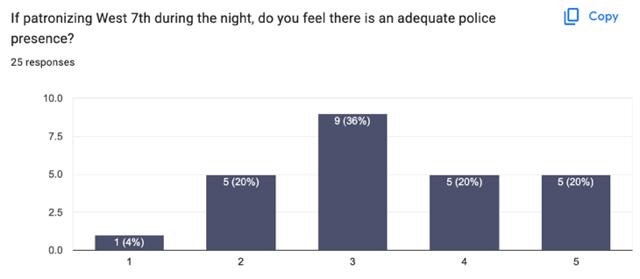

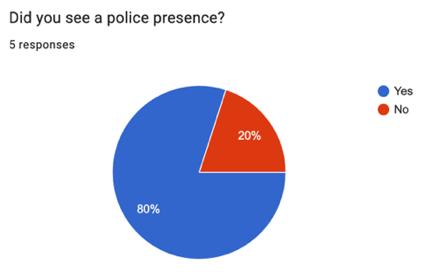
Patron Safety and Private Security
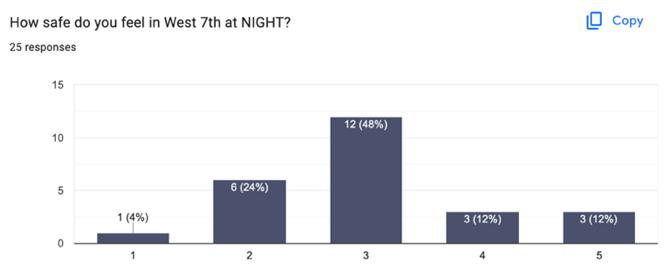

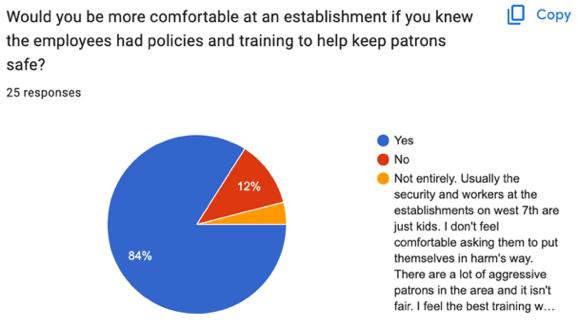
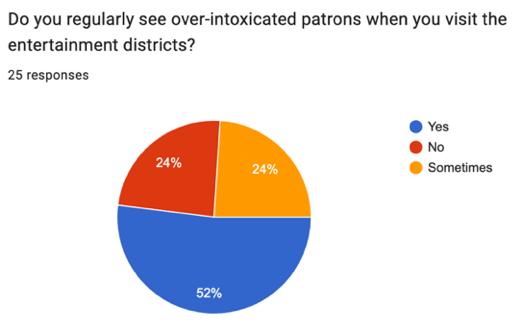
(See SteerFW for a complete summary of patron responses)


Recommendation 1: Adopt a Multidisciplinary Team
The priorities of a multidisciplinary nightlife team are as follows:
1. Safety
The multidisciplinary team should prioritize prevention over enforcement to intervene in the most harmful offenses
2. Inter-Agency Relationships and Processes
Developing inter-agency communication, accountability, and trust among team members will broaden knowledge of other agencies' functions and capabilities, which is essential when creating a unified prevention strategy.
3. Team Members
Individual team members are responsible for training their agency peers, maintaining support from their department's leadership, and helping their agency support the unified nightlife strategy.
4. Cross-Training
Cross-training all team members in alcohol service laws, occupancy levels, detecting fake identifications, noise violations, and active violence incidents enables each team member to address issues before they escalate.
5. Directives and Policies
Team members create enforcement policies and directives to provide "wrap-around" services to businesses. The team will provide bar and restaurant owners with information and guidance to maintain compliance with the law and the accreditation model.
6. Nightlife Operational Plans
The unified team should strive to duplicate the Golden Lasso standards outside of the establishments by having clear policies, directives, and training to reduce alcoholrelated violence.
7. Transparency
The nightlife team is strongly encouraged to share the established standard operating procedures with businesses so everyone can access and understand the process.
8. Thresholds
Establish thresholds for immediate action, prioritizing violations that threaten health or safety


Recommendation 2: Adopt a Relationship-Based Approach
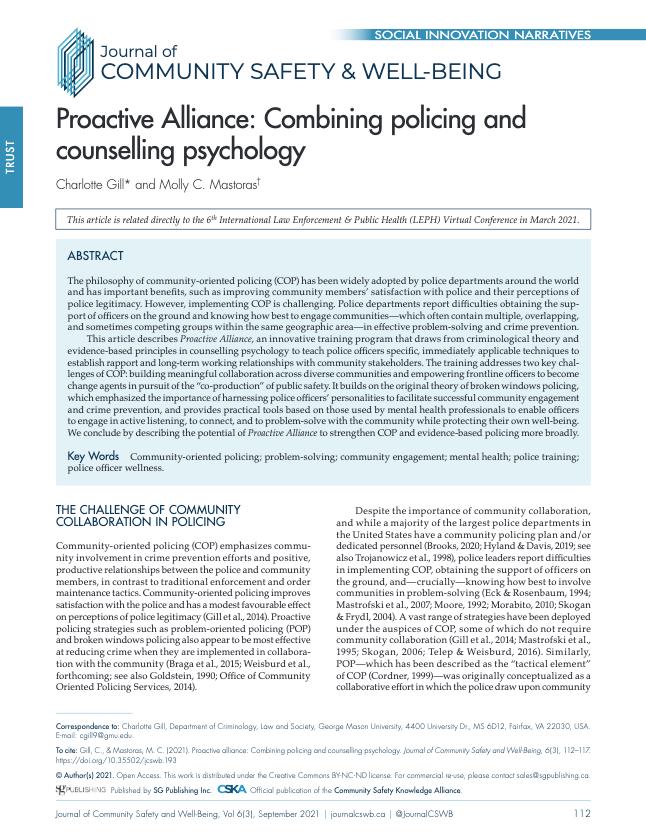
The Proactive Alliance's relationship-based approach serves as the foundation for enforcement agencies to establish and maintain trust with business owners and the broader community. The Proactive Alliance relationship-based approach is an empathy-based, trauma-informed method of community engagement rooted in counseling psychology and social work. It prioritizes multidisciplinary collaboration from a prevention standpoint and compels law enforcement agencies to proactively seek community stakeholders to build relationships and form problem-solving partnerships. Proactive Alliance extends beyond traditional “community policing” by teaching students how to facilitate cooperation rather than demand it. This approach also trains students to work more efficiently and effectively with collateral agencies and community stakeholders to reach mutually beneficial outcomes.
Rutgers University Center on Public Security Certification In partnership with Simsi and Rutgers University Center on Public Security, Fort Worth city staff can apply for a Proactive Alliance certification from Rutgers University. This credential establishes a baseline standard of excellence for professionals utilizing Proactive Alliance to enhance public safety and community wellness. The certificate is free, and there is no cost to apply.
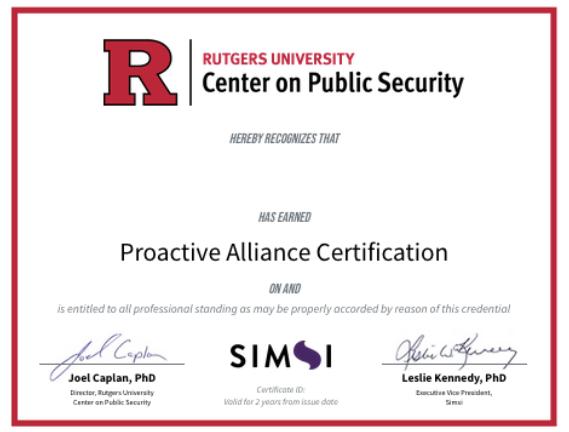
Safe Night Spotlight – Assistant City Manager Fernando Costa (Ret.), City of Fort Worth
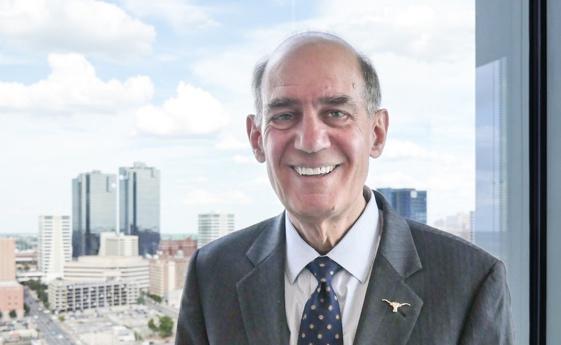
“The degree of participation by local businesses and the documented reduction of criminal activity provide compelling evidence about the effectiveness of Safe Night’s data-driven, holistic approach to the safety and economic vitality of our entertainment districts. Equally important, Safe Night has provided Fort Worth's public officials and business leaders with the guidance that they need to sustain this progress into the future.“
Fernando Costa served as an assistant city manager for the City of Fort Worth when the city hired Safe Night LLC to study the safety and economic vitality of its entertainment districts. He retired from the City in October 2024, after 48 years in city planning and management. He now advises clients on economic and community development projects and serves on the boards of various nonprofit organizations, primarily focused on education, human relations, and urban revitalization.


Recommendation 3: Establish a Unified Nightlife Strategy
Adopt a Problem-Oriented Approach
Embracing a problem-oriented approach begins with analyzing and identifying the most prominent issues, including evaluating the practices of city agencies.
Collecting nightlife-specific data provides context, identifies patterns and trends, and validates the effectiveness of prevention measures. The goal of data-informed evaluation is to create actionable plans to reduce the frequency and severity of violence and disorder based on evidence.
Expand the Role of Neighborhood Policing Officers (NPOs)
These officers play a crucial role in fostering relationships with the business community and residents. The NPO role could expand to support the nightlife team, with responsibilities that include establishing relationships with bar and venue owners, security personnel, and local city agencies for collaborative problem-solving and addressing issues
Commit to Agency Deployment During Nightlife Hours
Currently, only FWPD assigns staff to work during nightlife hours (9 pm – 3 am). Additional city agencies, including fire inspectors, public health officials, and code inspectors, should be assigned to work during nighttime hours. Liaisons working during nightlife hours can cultivate relationships with business owners, deploy prevention strategies, and implement interventions when most needed.
Provide Peer-to-Peer Nightlife Training
It is recommended that all team liaisons provide training to their peers, immediate supervisors, and executive staff to build support for the unified nightlife strategy and align duties with the new prevention-based approach.
Enhance Off-Duty Officers' Responsibilities in the Entertainment Districts Officers working in an off-duty capacity can contribute to the goals of the nightlife team. Training off-duty officers in nightlife management increases their competency and includes them as an important component of the unified strategy.
Obtain Accurate Patron Counts
Accurate patron counts are crucial for effectively allocating public safety resources. Restaurant and bar owners should record and share their incoming and outgoing patron counts with the nightlife team and the program lead.
Recommendation 4: Adopt Risk Terrain Modeling (RTM)
Risk Terrain Modeling is a geospatial analytic tool that identifies specific environmental conditions contributing to crime, traffic crashes, and other complex community problems. This place-based analysis model can provide accurate forecasts of the highest-risk settings, enabling city agencies to deploy resources efficiently and disrupt the factors contributing to complex issues
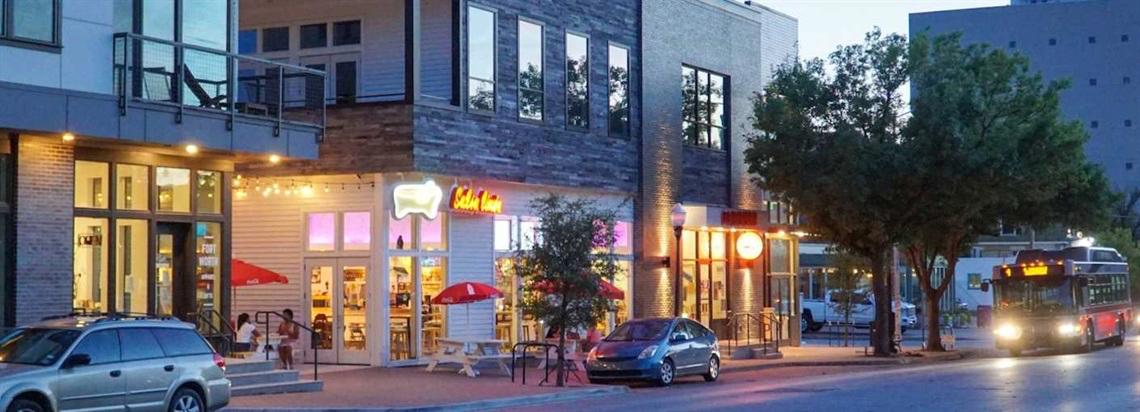

Recommendation 5: Enhance Procedural Justice
It is recommended that the nightlife team incorporate procedural justice into their work and processes.
Recommendation 6: Broaden Public-Private Partnerships
Establish a public-private partnership that allows municipal agencies and establishments to work together to identify the most harmful offenders. This model involves information sharing and collaborative problem-solving to address crime near nightlife establishments and parking areas.
– Golden Lasso Project Lead Kimberly Tyler, City of Fort Worth Fire & EMS Department

“We know that community partnerships are the key to creating safer, more vibrant neighborhoods, and that's the principle behind the Golden Lasso Program. We created the program in partnership with Safe Night in response to community concerns about safety and rising crime in our entertainment districts, bringing together City departments and local businesses in a unified effort. Since our official launch in March 2025, we've accredited 16 bars and restaurants whose owners and staff have committed to upholding our safety standards and fostering a safe, enjoyable nightlife experience for everyone.”
With more than twelve years of public service experience, including eight years with the City of Fort Worth, Kimberly has built a career rooted in collaboration and community engagement. She began her career with Fort Worth in Code Compliance, later served in the City Manager’s Office, and currently works as the EMS Compliance Manager for the Fort Worth Fire Department. A Certified Mediator specializing in Dispute Resolution, Kimberly has also served on several community boards and organizations, reinforcing her dedication to bringing people together to solve complex challenges.


Recommendation 1: Implement a Voluntary Accreditation Model for all Entertainment Districts in the City of Fort Worth Voluntary accreditation programs, such as Best Bar None, Arlington Restaurant Initiative (ARI), Copper Star certification, Gold Bar Norfolk, and the Village Safe Spot, prioritize staff and patron safety as the first and most crucial step in building vibrant nightlife areas. Bars, restaurants, and special event venues participating in the Golden Lasso accreditation model will expand and improve employment policies and training, focusing on staff and patron safety.
Recommendation 2: Use Data for Evaluation
As the steward of the Golden Lasso accreditation model, it is recommended that the program lead collaborate directly with the FW Lab and the nightlife team and have regular access to the team's observations and documentation.
Recommendation 3: Enhance the Role of Safety Ambassadors and Private Security Public improvement districts can expand the roles of ambassadors and private security. The nightlife team can provide peer-to-peer training for ambassadors and private security staff in nightlife operations, as well as in areas such as criminal and civil liability, homeless outreach, and active bystander training.
Oversight of the Bar Safe Program
It is recommended that the program lead oversee a Bar Safe patron accountability program, using the Business Crime Reduction Partnership model as its foundation. The Bar Safe program involves information sharing and collaborative problem-solving to address crime near businesses, hotels, nightlife establishments, and parking areas. Ambassadors can manage the day-to-day operation of the Bar Safe program.
Recommendation 4: Expand Partnerships and Promote the Accreditation
A vital part of the success of a voluntary accreditation program is helping both the hospitality community and patrons understand its value. To raise awareness, the program lead, City of Fort Worth Economic Development, Visit Fort Worth, and the Cultural District Alliance should collaborate to promote the program with residents, community groups, and ancillary businesses. Public support from elected officials and trade associations is also required to promote the accreditation model.
Recommendation 5: Establish a Communication Process to Include All Entertainment Districts and Businesses
It is recommended that the program lead host a meeting for businesses every three to six months to share successful strategies and practices. This meeting provides businesses with access to the most up-to-date practices and fosters a sense of community among business owners from various districts.



The Golden Lasso Accreditation is a multi-faceted voluntary accreditation program that prioritizes safety at establishments that serve alcohol. Voluntary accreditation programs, such as Best Bar None in the U.K. and Canada, the Arlington Restaurant Initiative, and the Copper Star, are successful because they prioritize staff and patron safety as the first and most crucial step in building safe and vibrant nightlife areas.
Standardized bar and restaurant accreditation models improve employment policies and practices that help keep staff and patrons safe. With its focus on safety and well-being, the Golden Lasso voluntary accreditation program addresses the foundational concern of Fort Worth’s nightlife areas: providing a safer nightlife experience for everyone
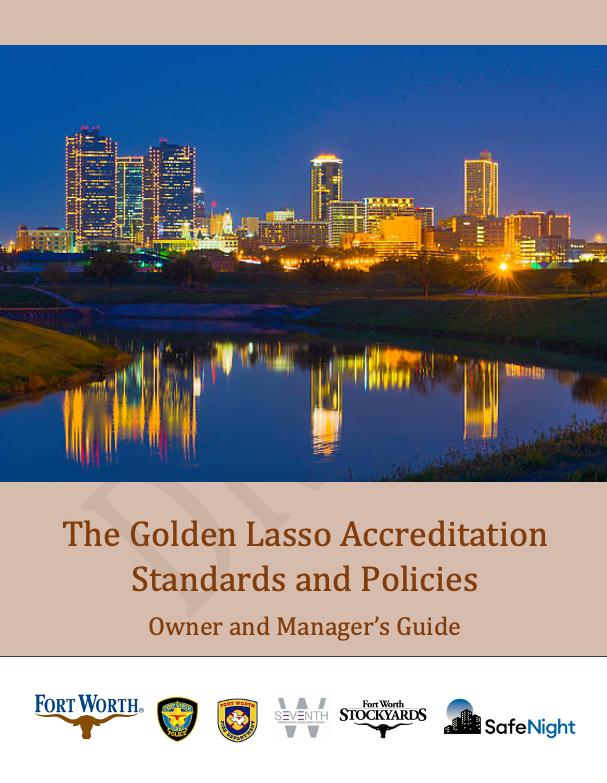
The voluntary Golden Lasso Accreditation program is designed to support businesses, organizations, and establishments in the nighttime economy. Participation in the program requires businesses to meet higher operational standards, implement employee policies, and participate in training to improve safety and reduce liability.
Nighttime operators in Fort Worth achieve the Golden Lasso Accreditation by writing employee policies and procedures that meet the program standards in the following sections:
• Public Safety – Reduction of risk related to crime or injury
• Fire Codes – Enhances compliance with fire codes, including occupancy, means of egress, fire protection systems, emergency lighting, and accessibility
• Public Health Codes – Enhances compliance with safe food handling and equipment codes.
• Zoning and Building Codes - Compliance with the City of Fort Worth ordinances for outdoor seating, noise/music levels, and maintaining clearance for pedestrians.
• Community Partnerships - Practices that show businesses are considerate and invested in being good neighbors.


Fort Worth City Council Resolution
On May 15th, 2025, the Fort Worth City Council passed resolution “6907-05-205, The Golden Lasso Accreditation Program for Restaurants and Bars in Entertainment Districts.” The City of Fort Worth, Texas, has established the Golden Lasso Accreditation Program to promote public safety in its entertainment districts. This free and voluntary program provides a certification process for bars, restaurants, and similar venues to review and enhance their safety practices for both patrons and employees.
Participating establishments can formalize their practices through the development of policies and employee training, and utilize a "Safety-Branded Entertainment" logo to signify their accredited status, thereby enhancing public confidence. The City intends to inform the public and visitors of participating venues through efforts coordinated with Visit Fort Worth. The program is not intended to be used punitively and will not be used to create specific zoning policies, future permitting restrictions, additional code enforcement requirements, or excessive requirements beyond current laws. Although the program was developed for entertainment districts, it's available to venues across the entire city.
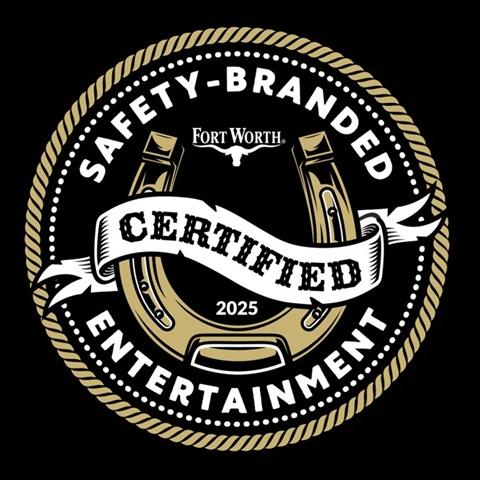
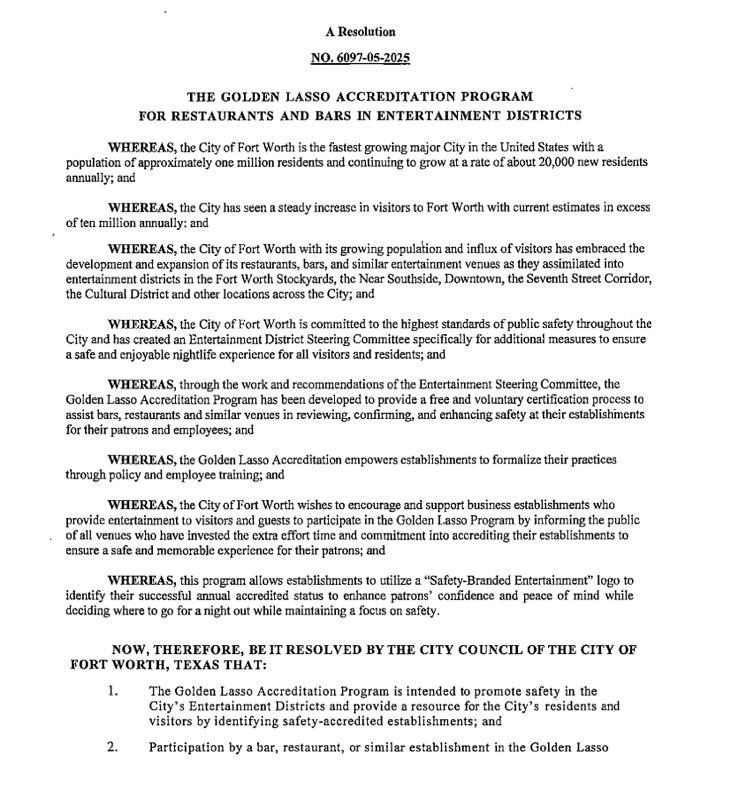
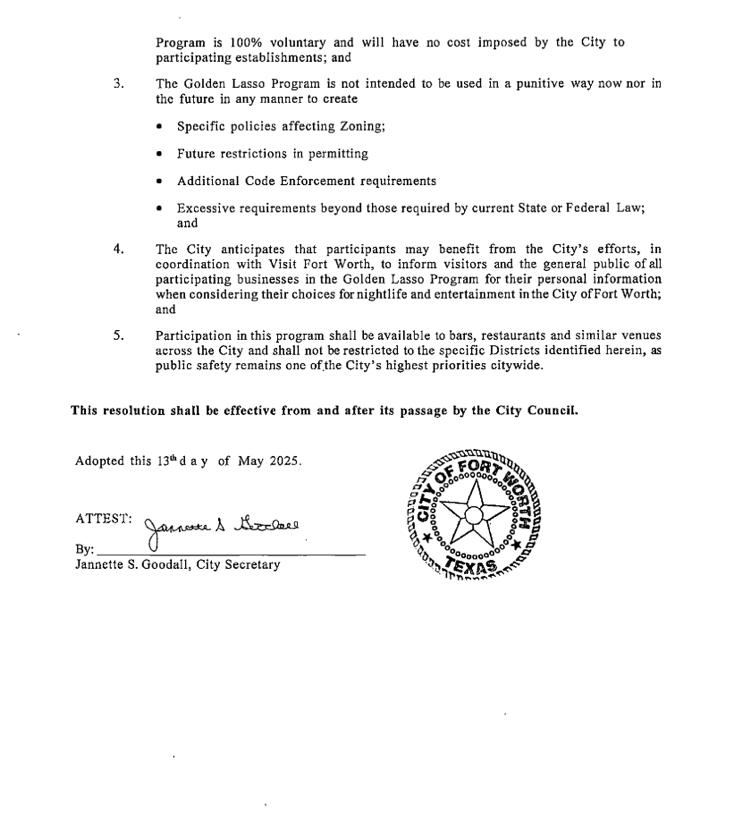


Golden Lasso Accreditation Recognition
The Golden Lasso Accreditation hospitality program has garnered much attention from the community and the local media. An article from Hoodline Dallas, Fort Worth Introduces Golden Lasso Accreditation to Enhance Safety in Nightlife Districts states:

“Fort Worth is setting a new standard for nightlife safety with the soon-to-launch Golden Lasso Accreditation, aimed at bars, restaurants, and venues in its four main entertainment districts. This voluntary certification, which comes at no cost to establishments, is designed to give patrons a visible sign that the place they're enjoying their night out is committed to security and safety measures.
The Golden Lasso targets TABC-licensed establishments specifically, looking to reduce alcohol-related issues and foster a community of trust among nightlife business owners the City, state agency partners, and the community as a whole, Safe Night LLC, a global consultant firm specialized in safety enhancement, was brought in to conduct an analysis, develop the accreditation guidelines and recommend training for staff in hospitality roles (N. Simmons, Hoodline, March 10, 2025).”
"The Golden Lasso is going to let you know this is a safe place and we’re all actively trying hard to keep it a safe
place."
- Chas Taipale, President of the West 7th Restaurant & Bar Association (D. Anglin, Fox4, April 29, 2025)
A Fox4 (KDFW) television report highlighted the Golden Lasso program in the following way: “A new safety accreditation program will allow West 7th district bars and restaurants to undergo specialized training to earn what’s called a ‘Golden Lasso’ rating. ‘The Golden Lasso is going to let you know this is a safe place and we’re all actively trying hard to keep it a safe place," said Taipale. Key staff will get certifications in the areas that include:
• Responsible alcohol services
• Criminal and civil liability
• Security against drink spiking
• Crowd management
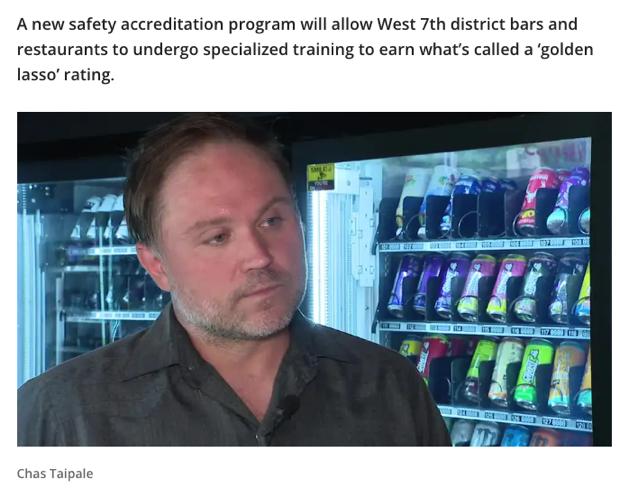
• CPR and Narcan administration (for possible drug overdoses)
• Active shooter response”

(D. Anglin, Fox4 KDFW, April 29, 2025)

The following bars and restaurants were among the first to earn the Golden Lasso accreditation, setting an example for other business owners in the city:
West 7th
• BAR 2909
• Reservoir-Bar, Patio & Kitchen
• Koe Wetzel's Riot Room
• Whiskey Garden
• Junk Punch
• Bodega West 7th
• Dirty Laundry
• El Chingon
• Ampersand
• The Shot Cellar
• ShipWreck
Stockyards
• Star's Basement Bar
• Star Cafe and Cocktails
Magnolia
• Proper City
• Rusty Nickle Icehouse
• Townes Drive Thru

Emil Bragdon, owner of several establishments in Fort Worth and President of the Funky Lime Hospitality Group, was interviewed on October 6, 2025, by NBC 5 DFW. He emphasized the importance of bar owners and staff doing everything possible to keep patrons safe within their establishments, while also collaborating with city agencies to ensure safety on the streets.
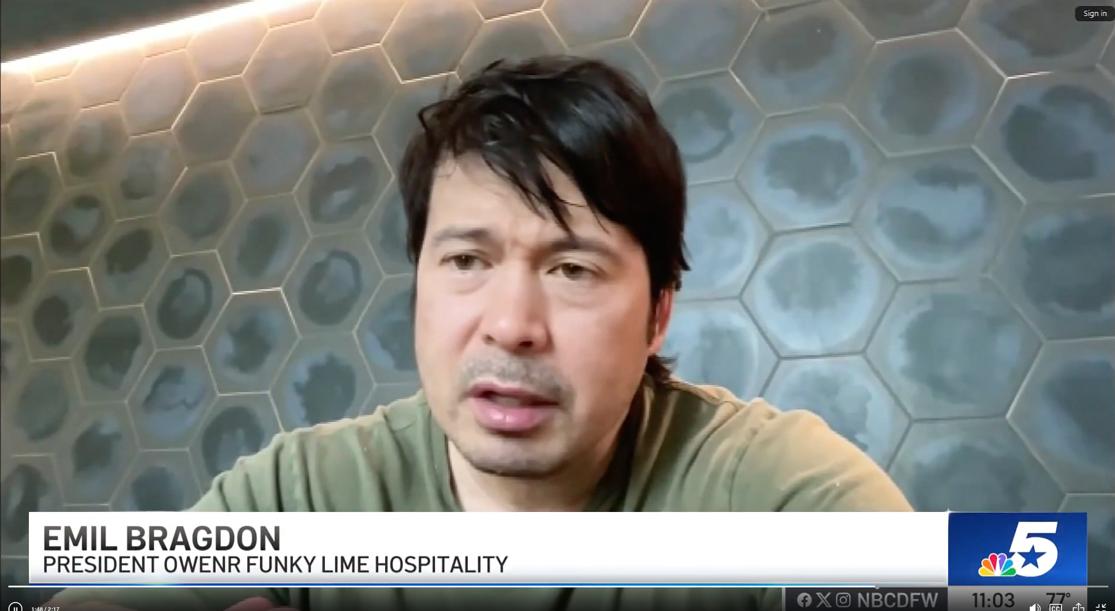


Safe Night Spotlight – Chas Taipale, President of the West 7th Restaurant & Bar Association

Chas Taipale has been involved in discussions with the city and Safe Night to improve safety in the district. “I support the Golden Lasso program and believe it will help businesses brand themselves as safe places. I think it will improve communication and ensure staff understand their role in keeping patrons safe.”
Chas Taipale has been a business owner and member of the Fort Worth community for decades. He is the owner of the establishments Bodega West 7th and Dirty Laundry, in addition to being the president of the West 7th Restaurant & Bar Association.
Safe Night has provided the City of Fort Worth with several benchmarks to measure the impact of the Golden Lasso program on public safety and economic vibrancy. Together with the municipal agencies, businesses, and public improvement districts, all play a part in keeping the city’s entertainment districts attractive to residents and tourists.
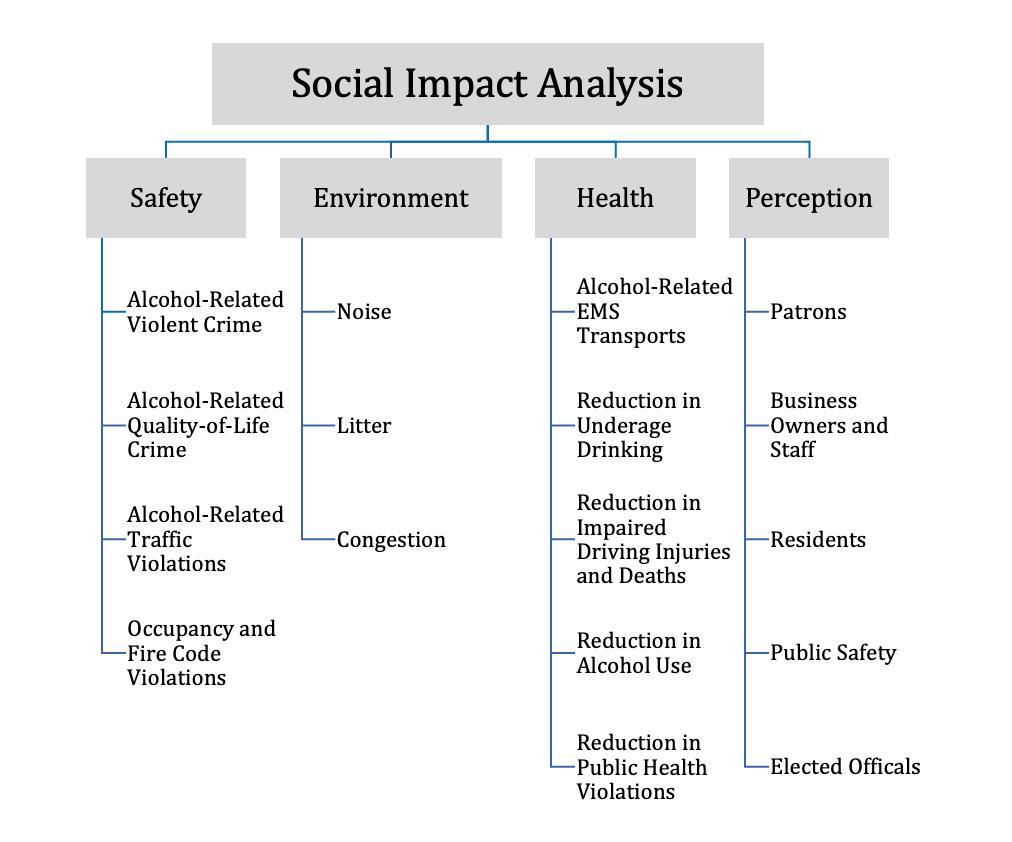


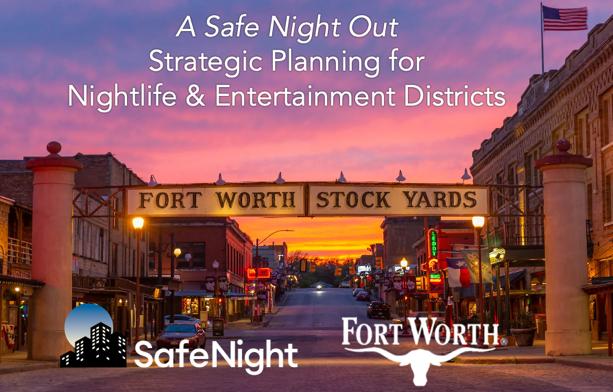
Safe Night’s nightlife management model incorporates multi-faceted training, which includes evaluating the need for nightlife management, collecting data and analysis, and developing higher standards of operation for businesses that serve alcohol. The foundation of Safe Night’s model is the Proactive Alliance (PA) relationship-based approach. PA uses methods adapted from evidence-based counseling psychology concepts, teaching municipal staff how to build relationships with business owners while breaking down barriers to collaborative problemsolving (Gill & Mastoras, M., 2022). This model provides a path to involve all stakeholders when implementing strategies to reduce alcohol-related harm and improve safety and economic viability.
In March 2025, Safe Night staff traveled to Fort Worth to teach A Safe Night Out to staff from the following agencies and organizations:
• Fort Worth Police Department
• Fort Worth Fire and EMS Department
• Fort Worth Code Compliance Office
• Fort Worth Economic Development Office
• Fort Worth Environmental Services
• John Peter Smith Hospital
• Stockyards Inc.
• Fort Worth restaurant, bar, and club owners
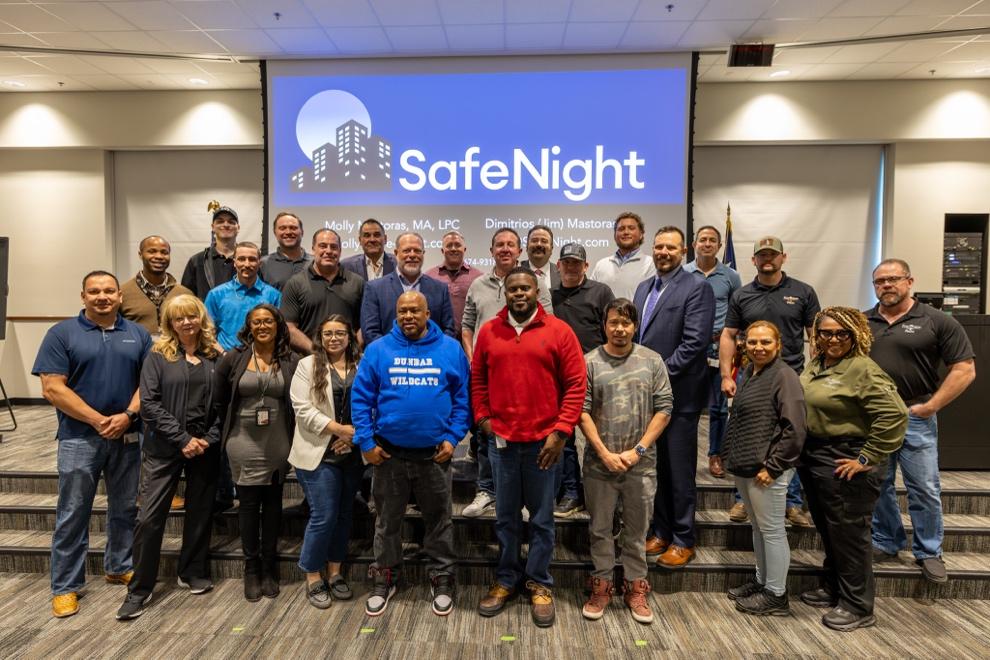
A Safe Night Out nightlife management training introduced Fort Worth city staff to several concepts that will strengthen their collective problem-solving and help them develop relationships with business owners and staff. Safe Night's blueprint enables city staff to address several other complex issues facing the city, including downtown crime, managing individuals experiencing homelessness, and improving traffic safety.


City staff were asked to evaluate A Safe Night Out and Proactive Alliance training. The survey results showed that city agency staff strongly connected with Safe Night’s concepts for building relationships to improve collaborative problem-solving. City staff reported the following in the survey:
• Proactive Alliance's relationship-based approach overwhelmingly changed the way city staff view themselves and the community for the better
• City staff agree that empathy helps them connect with the community while learning to become problemsolvers
• City staff feel they will be able to apply the knowledge learned and have more resources to work with when they are in the field
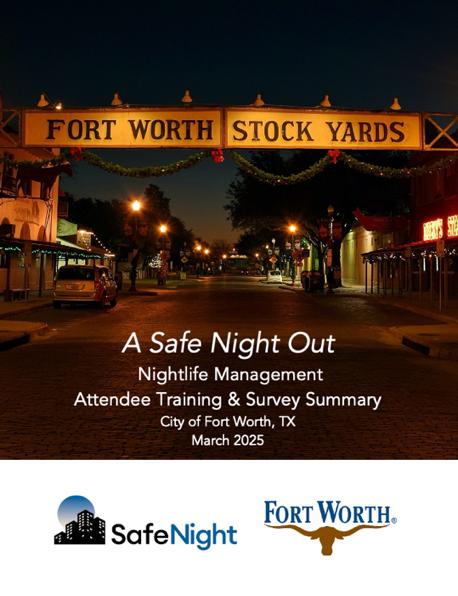
• City staff reported that meetings and training with Fort Worth’s business owners and managers
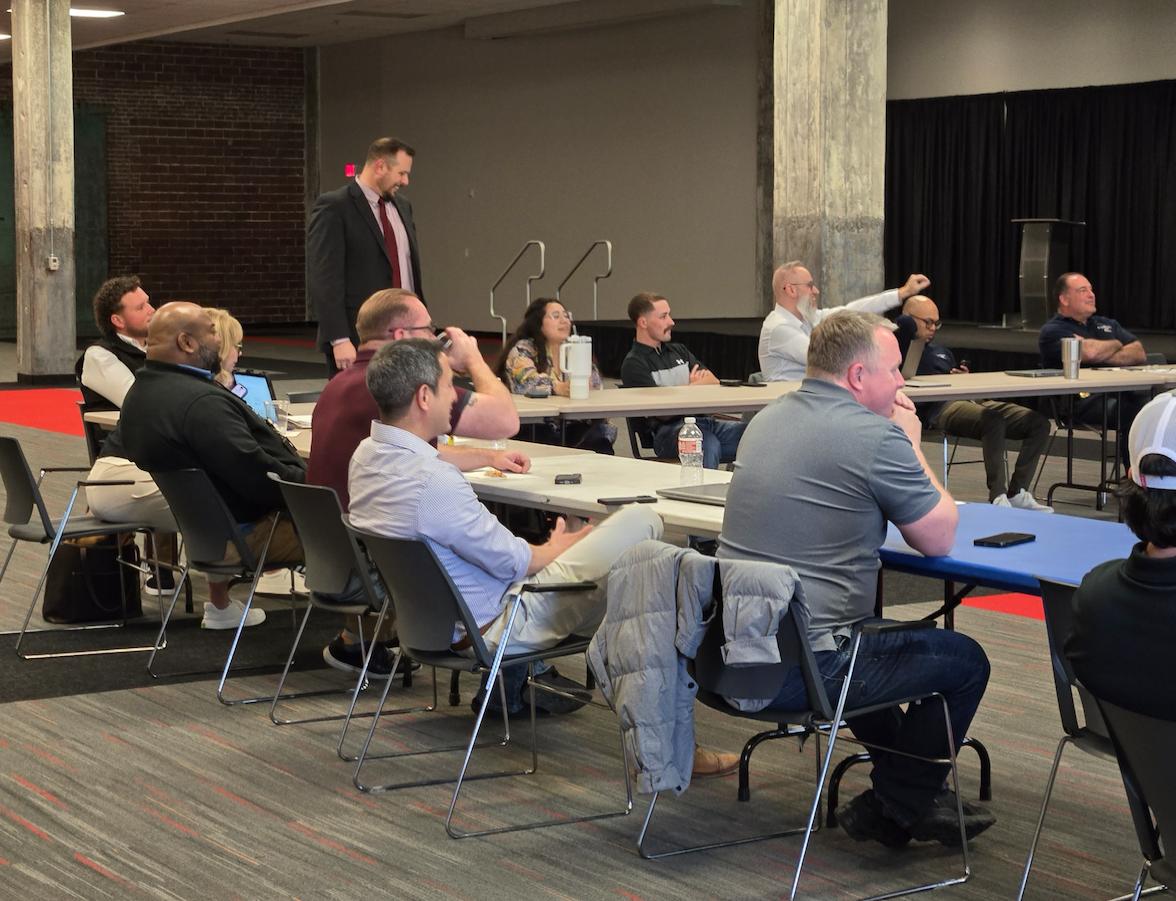
“My eyes are completely opened to all of the ways that we can improve and work together to make our residents feel safe.”
“Hearing from other departments on their issues and the reasoning behind their issues, so I couldn’t assume that they just didn’t want to assist my department.”
“Outreach vs Engagement. Knowing the difference.”


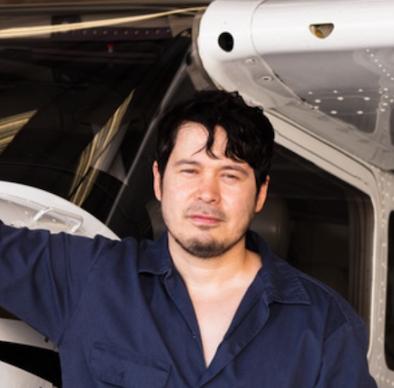
"I am a seasoned 30+ year veteran in the bar, restaurant, nightclub industry, and attended A Safe Night Out nightlife management program, and was a little skeptical walking into the training. I have attended other training programs and was expecting a disconnected consultant who had no idea about how these venues truly operate.
Within the first hour, I knew Safe Night was different. Safe Night staff was actually using a lot of the same verbiage as I would, and realized the Golden Lasso accreditation program was asking us to implement policies and practices we already have. Additionally, there are many inexperienced owners in this industry who can benefit from this program."
Emil Bragdon is the president of Funky Lime Hospitality Inc. and currently owns and operates seven establishments, with plans to expand to nine within the next six months. He has been in the hospitality industry for 33 years, and it is a true love and passion for him. He is grateful to have found what he loves to do at an early age, and Emil is currently a student in concept development, operations, and design.

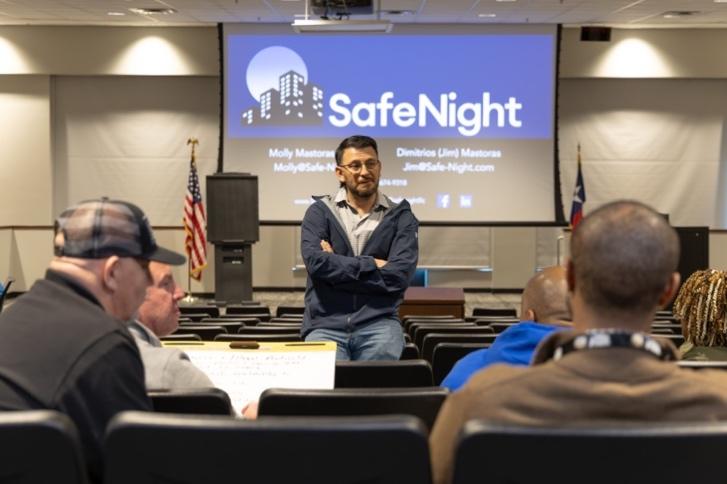
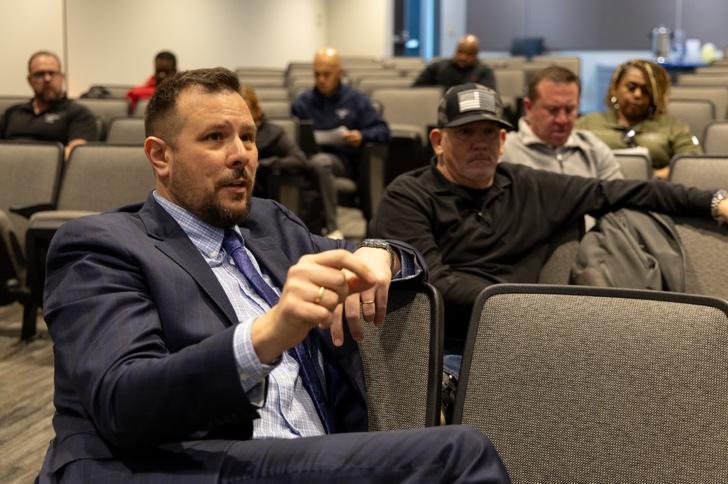
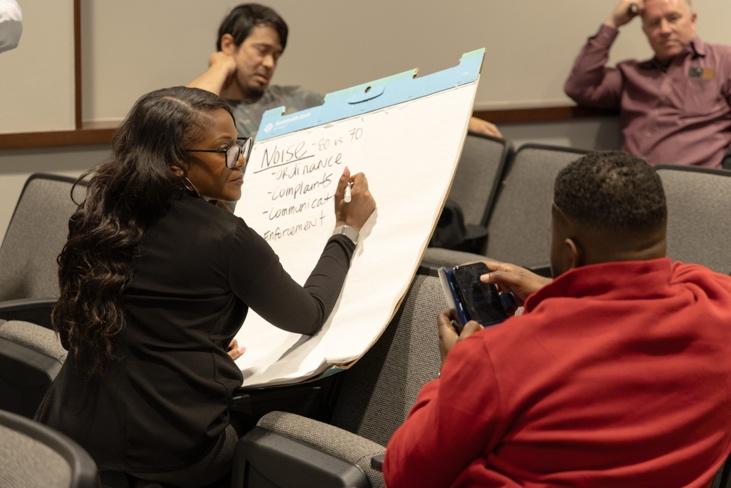


Fort Worth city staff, business owners, and community stakeholders collaborated to address distinct issues in the entertainment districts during the final training day. Safe Night instructors challenged them to do the following:
• Identify a problem in their community and responses beyond reactive enforcement
• Identify specific names of stakeholders to recruit for problem-solving
• Describe how staff plan to manage reticent stakeholders and build relationships
• Evaluate stakeholders’ capacity for change and ability to collaborate
• Use a problem-oriented approach
During this collaborative workshop, attendees were tasked with choosing a project lead, delegating assignments, and prioritizing relationship-building with vital stakeholders. Instructors advised attendees to select a project lead based on ability, knowledge, and motivation rather than on rank or seniority. Attendees documented the steps to secure stakeholder support and to build a collaborative prevention strategy.
Issues Identified by Staff
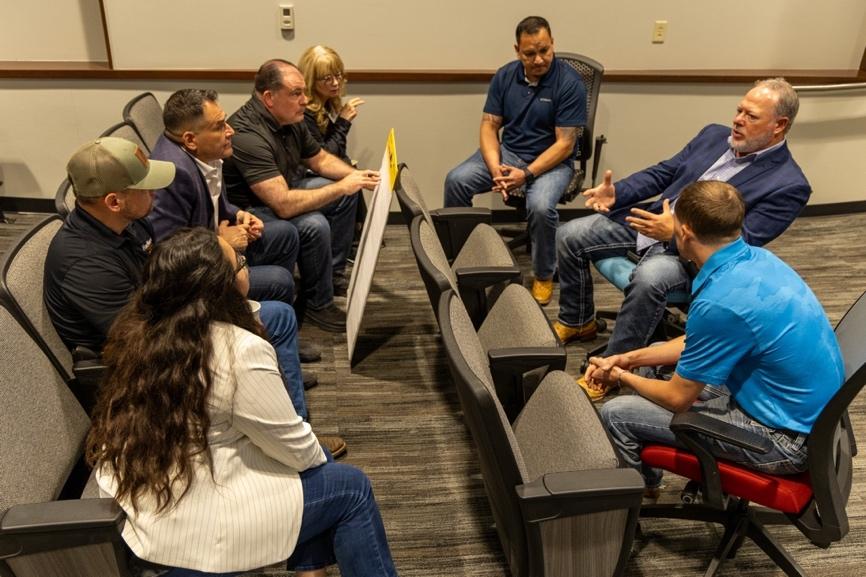
Staff collectively identified the following issues in the workshop:
• Lack of trust from bar owners
• Limited understanding of city agency capabilities and resources
• Lack of relationships and collaboration among city staff
• Citizen complaints about noise from bars and restaurants
• The proposed ordinance does not appear to be supported by data or research
• Develop procedures for addressing violence and illegal activity at bars on days when a dedicated police detail is not present
• Security responses to illegal activity are not universal
FWPD reported that Proactive Alliance has transformed the way they build relationships with Fort Worth Code Enforcement and the Tarrant County Public Health Department. These agencies have been more active in assisting businesses with compliance and prioritizing a prevention-based approach in coordination with FWPD. This includes additional crosstraining for police officers involved in interventions to ensure food trucks comply with obtaining the necessary health department licensing (P. Genualdo, August 4, 2025).


The FWPD West 7th District team also shifted their deployment from fixed locations, where officers perceived issues, to Safe Night’s recommendation of zone deployments. Officers are now responsible for specific bars, and FWPD staffing is adjusted based on data and calls for service throughout the district.
Violence and crime in the West 7th Entertainment District has been a concern for many in the community over the last several years. While serious offenses such as shootings and aggravated assaults have garnered attention from the media and the community, Safe Night demonstrated that FWPD should prioritize the prevention of offenses that lead to violence, such as public intoxication, disorderly conduct, and simple assault.
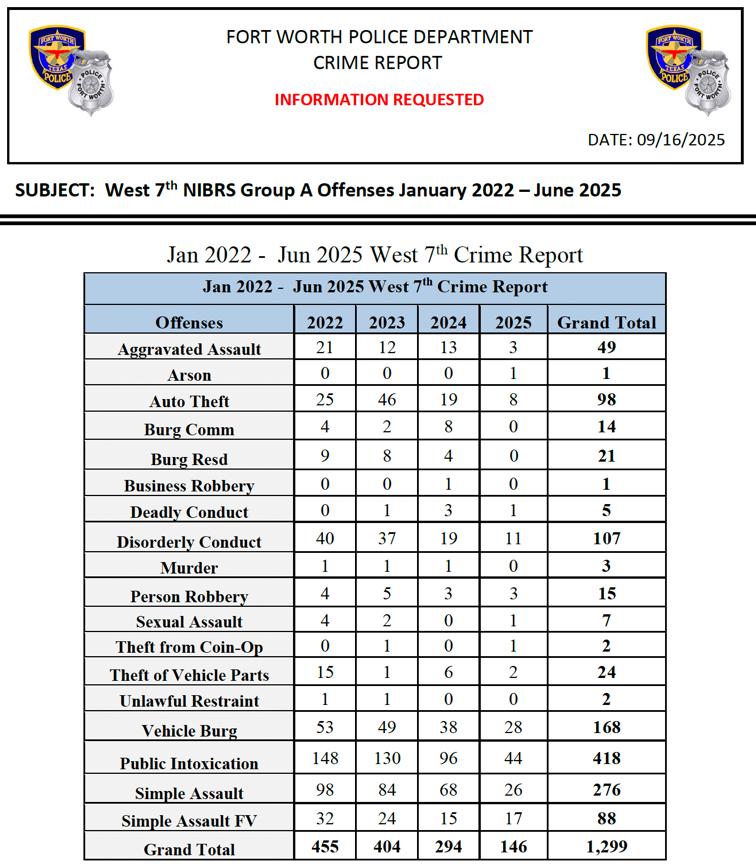
What is worth noting is that the West 7th saw substantial decreases in the types of crimes (public intoxication, disorderly conduct, and simple assault) that Safe Night recommended FWPD focus on preventing that contribute to violent crime
FWPD - West 7th Entertainment District
After completing A Safe Night Out training, the West 7th FWPD patrol team leadership is also directing officers to engage with security staff and patrons by making interventions in offenses that lead to aggression.


The West 7th entertainment district has experienced a decline in violent crime between 2023 and 2024, which is consistent with nationwide trends in violent crime (Council on Criminal Justice, 2025).

A Hoodline article from April 2025, the drop in crime is as follows: “In the bustling West 7th Entertainment District of Fort Worth, a sharp decline in major crime has been reported, with figures indicating a 36% drop from 2023 to 2024. Data points to an enhanced police presence as a key factor in discouraging acts such as aggravated assault, robbery, and other severe criminal offenses” (R. Dawson, April 26, 2025).
“Since 2023, the West 7th District has seen a 54% decrease in public intoxication, a 42% decrease in disorderly conduct, a 61% decrease in simple assaults, and a 76% decrease in aggravated assaults, according to statistics from the Fort Worth Police Department. ‘This is due to the proactive prevention of offenses that lead to violence between 2024-25,’ police spokesperson Officer Bradley Perez said.”
(H. Mantas, Fort Worth Star-Telegram, October 6, 2025)
An October 6, 2025, article in the Fort Worth Star-Telegram discusses the efforts Fort Worth has made to improve safety in the West 7th District. The city rerouted traffic, increased police prevention efforts, and funded a safety study.
Additionally, Fort Worth has partnered with local businesses through the new Golden Lasso Program. This voluntary accreditation initiative recognizes bars and restaurants that implement policies and practices to enhance safety, such as prohibiting underage drinking and having a weapons policy. Businesses must meet a certain point threshold to be accredited and receive a sticker to promote their participation (H. Mantas, October 6, 2025).



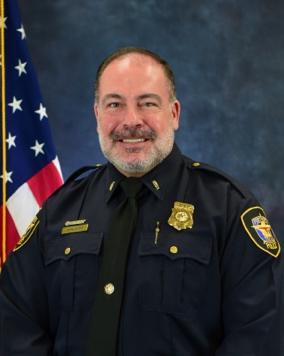
“The City of Fort Worth has grown rapidly in the last decade, and with that growth has come challenges. Among these tasks is the responsibility of keeping the city’s multiple entertainment districts vibrant, lively, and safe. Traditionally, the focus has been on the old way of doing business, i.e., through enforcement. The expectation was that by providing enough police and arrests in an area, things would remain “under control”. However, this model has proven to be outdated, as its focus has been reactive rather than preventive.
Since entering into a partnership with Safe Night, we have begun to emphasize a more holistic, community-based approach. We are leveraging our relationships with our business partners and local stakeholders to take the onus off the Police Department. We now invite participation from all affected parties in the problem-solving process. We are also working more closely with other city agencies to explore opportunities for training and education for the businesses in our area. Our collaborative approach has already begun to pay significant dividends, as we have seen crime rates drop significantly. While there is still progress to be made, our initial foray into the Safe Night model has been successful.”
Lieutenant Paul Genualdo has been a police officer with the City of Fort Worth for 27 years. He has overseen the West 7th Rapid Response Unit since March of 2022 and has worked to redefine police response in the city’s West 7th Entertainment District.
The West 7th Restaurant & Bar Association and Fort Worth city agencies meet monthly to discuss issues, problem-solve, and conduct training. The meetings have included bar owners and staff from community partners, such as the University of North Texas’s Health Science Center and Safer Care Texas, which provides Narcan training. There are also plans for the JPS Health Network to begin training staff on the life-saving “Stop the Bleed” program.
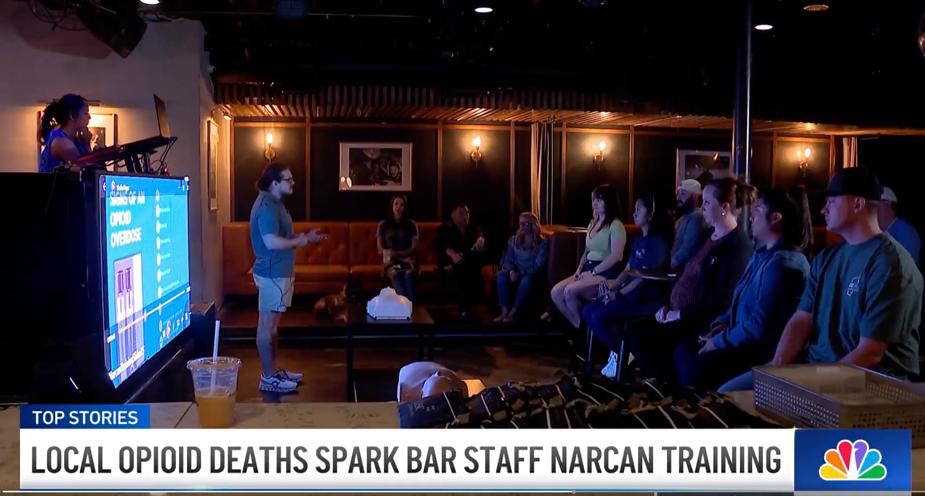
KXAS-TX


Adopting Safe Night’s blueprint for building relationships and nightlife management is just the beginning. Managing complex issues also requires the creation of a well-functioning, collaborative, multidisciplinary team that utilizes data-informed strategies and consistently cultivates individual relationships. These efforts will be even more important when the Dallas-Fort Worth area welcomes millions of visitors from around the world for the FIFA World Cup in 2026. The Golden Lasso program can help businesses operate at a higher level of safety and community partnership, while also welcoming an influx of visitors.
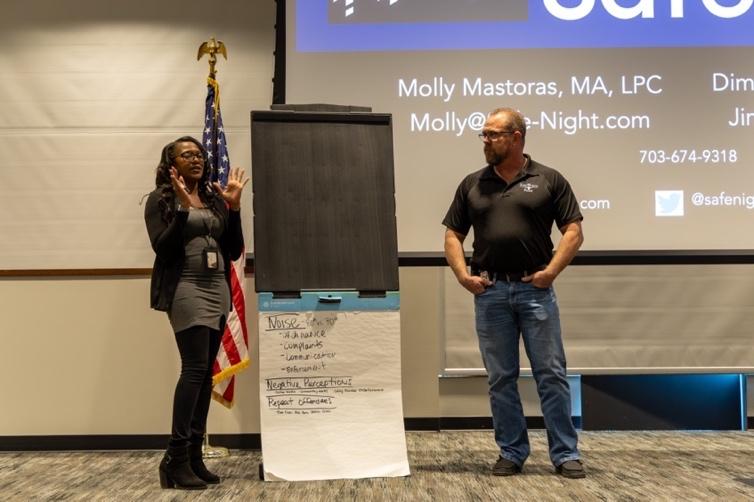
Over the last several years, the West 7th entertainment district has garnered the attention of city agencies, the community, and the media. However, as the Stockyards continues to grow, attracting more than 9 million visitors, which is nearly 80% of Fort Worth’s 11.5 million yearly visitors (Bodine, January 26, 2024), the district will need to be prioritized for the expansion of public safety resources. The historic Stockyards is best known as the place “Where the West Begins,” where residents and visitors can experience lively entertainment, bars, and restaurants. Because the Stockyards is a signature attraction that draws a large portion of Fort Worth’s visitors, this area of the city may need the most attention and management in the coming years. Expanding the Golden Lasso accreditation and public safety teams to the Stockyards will keep this area safer and more vibrant, especially as the area’s popularity and economic success continue to grow.


Reducing alcohol-related harm and violence in nightlife areas requires a commitment from all key stakeholders. Building strong relationships, gathering and analyzing data, and coordinating efforts across agencies takes time. Creating a prevention-focused, collaborative approach that's built on trust and transparency takes openness, patience, and sustained effort from everyone involved. While starting a new approach can be challenging, research shows that it's worth it. According to Roberts et al. (2020), cities that adopt a holistic, systematic approach to nightlife and avoid relying solely on enforcement have a better chance of achieving economic success.
It's also worth noting that overly strict regulations on nightlife businesses can have unintended consequences. Heavy-handed enforcement can lead to a stagnant nightlife scene. For example, Sydney's "Lockout Laws" in 2014, which tightened closing times and alcohol service, resulted in a loss of approximately $ 16 billion for the city's nighttime economy between 2014 and 2019 (Gray, 2021). Finding the right balance between prevention and enforcement is key to a thriving nightlife economy. By understanding the needs and expectations of stakeholders through a relationship-based approach, we can strike that balance.
Building a foundation for nightlife management rooted in trust, transparency, and individual relationships will yield long-term benefits for both the community and the economy. Safe Night is excited to support and facilitate the initial stages of this cultural shift, and we look forward to helping Fort Worth continue to grow and thrive.


Anglin, D. (April 29, 2025). Fort Worth helps bring crime down on 7th Street FOX 4 https://www.fox4news.com/news/fort-worth-helps-bring-crime-down-7th-street
Bodine, S. (January 26, 2024). From ‘unpolished gem’ to tourism magnet: Developer says authenticity is key to Stockyards’ success. KERA
https://www.keranews.org/business-economy/2024-01-26/from-unpolished-gem-totourism-magnet-developer-says-authenticity-is-key-to-stockyards-success
Council on Criminal Justice. (2025). Homicide, Most Other Violent Crimes Fall Below Pre-Pandemic Levels in U.S. Cities
https://counciloncj.org/homicide-most-other-violent-crimes-fall-below-pre-pandemiclevels-in-u-s-cities/
Dawson, R. (April 26, 2025). Major Crime in Fort Worth's West 7th Entertainment District Plummets by 36% Hoodline
https://hoodline.com/2025/04/major-crime-in-fort-worth-s-west-7th-entertainmentdistrict-plummets-by-36/
Gill, C., & Mastoras, M. C. (2021). Proactive Alliance: Combining policing and counselling psychology. Journal of Community Safety and Well-Being, 6 (3), 112 –117. https://doi.org/10.35502/jcswb.193.
Graham, K. and Purcell, J. (2003) Preventing Barroom Aggression: A Summary of the Results of the Evaluation of the Safer Bars Program
Gray, G. (2021, September 9). It's only taken a decade but the last Sydney lockout laws are finally gone. The Brag. https://thebrag.com/lockout-laws-sydney/ Homel, R., and Clark, J.W. (1994). THE PREDICTION AND PREVENTION OF VIOLENCE IN PUBS AND CLUBS
Mantas, H. (October 6, 2025). Fort Worth Created a Program to Cut Down Crime in West 7th Has it Helped? Fort Worth Star-Telegram. https://www.star-telegram.com/news/local/crime/article312404676.html
NBC 5 DFW. (October 6, 2025). Deadly, Violent Weekend Across Dallas and Fort Worth. https://www.nbcdfw.com/video/news/local/deadly-violent-weekend-across-dallas-andfort-worth/3928194/
Roberts, M., Eldridge, A., Osborn, G., & Flacks, S. (2020) "The Night and Cultural Benefit: The Case for A Holistic Approach to Licensing", Entertainment and Sports Law Journal 18(1), 9. doi: https://doi.org/10.16997/eslj.245
Rutgers Center on Public Security, (2023). Risk Terrain Modeling. https://www.riskterrainmodeling.com/


Simmons, N. (2025). Fort Worth Introduces Golden Lasso Accreditation to Enhance Safety in Nightlife Districts. Hoodline.
https://hoodline.com/2025/03/fort-worth-introduces-golden-lasso-accreditation-toSweat, C. (March 26, 2025). Fort Worth bartenders come together for hands-on NARCAN training. KXAS-TV.
https://www.nbcdfw.com/news/local/fort-worth-bartenders-come-together-for-handson-narcan-training/3801653/


Molly C. Mastoras, MA, LPC Co-Founder, President
Molly Mastoras is a Licensed Professional Counselor (LPC) in Virginia and Connecticut. She has worked as an assistant program director and probation counselor for the Fairfax County Juvenile & Domestic Relations District Court and as a social worker for the Fairfax County Office for Women and Arlington County Child Protective Services (CPS). Molly has worked extensively with survivors of sexual assault throughout her career, leading to the creation of Safe Night Active Bystander, a sexual assault prevention and intervention training program.

She developed the Proactive Alliance relationship-based approach, which teaches police and enforcement agencies to develop relationships to enhance problem-solving with the community using adapted counseling therapy concepts. She co-authored several articles, including Proactive Alliance in IACP Police Chief Magazine and Productive and Proactive in Sheriff & Deputy Magazine and Proactive Alliance: Combining Policing and Counselling Psychology in the Journal of Community Safety and Well-Being with Dr. Charlotte Gill.
Molly has presented the Proactive Alliance concept at the American Society of Evidence-Based Policing (ASEBP) conference, the Problem-Oriented Policing (POP) Conference, and the International Conference on Law Enforcement & Public Health (LEPH). Molly also serves on the Board of Directors for the Washington Regional Alcohol Program (WRAP).
Master Police Officer Dimitrios Mastoras (Ret.)
Co-Founder, Executive Vice President
Dimitrios (Jim) Mastoras is the co-founder and executive vice president of Safe Night LLC, a global consulting firm that provides strategies to improve policing, public safety, and economic viability. Jim served as a Master Police Officer in Arlington County, Virginia, for almost twenty-four years and was named Arlington’s first nightlife liaison. Jim’s nightlife management model was recognized as a national model to reduce alcohol-related violence and harm by the U.S. DOJ COPS Office in a toolkit he authored, The Arlington Restaurant Initiative - A Nightlife Strategy to Improve Safety and Economic Viability.
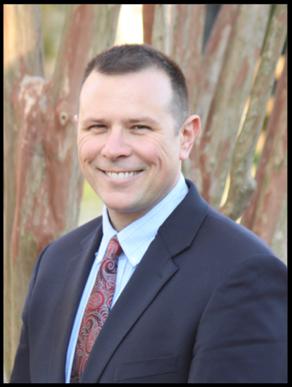
Jim is a senior Proactive Alliance relationship-based policing instructor teaching police and collateral city agencies how to establish trustful relationships with community stakeholders to shift to collaborative problem-solving. The Proactive Alliance relationship-based approach has been used to address many complex community issues across the U.S., including alcohol-related violence, homelessness, and traffic safety and engagement. He is also a nightlife safety and community engagement expert who regularly speaks at national conferences.
Jim has authored or contributed to numerous articles and case studies for the National Policing Institute, Policing Insight, IACP Police Chief Magazine, NSA Sheriff & Deputy Magazine, and Observatory of Public Sector Innovation.


Safe Night LLC, established in January 2018, is a consulting firm that combines the expertise of a licensed professional counselor and a career law enforcement officer to provide solutions to increase safety and economic viability for communities. Safe Night trains law enforcement agencies, including local and state enforcement agencies, police, fire marshals, code enforcement, and public health inspectors. Safe Night has years of experience in law enforcement, public policy, and social services. For more information about Safe Night and the Proactive Alliance relationship-based policing approach, visit Safe-Night.com.




